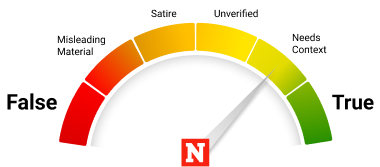Deepfake technology has become increasingly sophisticated over the years, so much so that it is now allegedly being used in warfare.
Deepfakes have become an effective tool for misinformation, as Newsweek Fact Check has previously reported, but did a "fake-off" really occur between agents of the Russian and Ukrainian counterintelligence communities?
The Claim
On October 9, 2022, The Main Directorate of Intelligence of the Ministry of Defense of Ukraine said on its official Telegram channel that Russian "pranksters" or "special services" had used deepfake technology to impersonate the Ukrainian prime minister, Denys Shmyhal, during a video call.

According to several viral Telegram and Twitter posts, Russian fraudsters were attempting to get in contact with Haluk Bayraktar, CEO of the Turkish defense technology company Baykar, but were met with similar trickery.
"The Russians attempted to contact Haluk Bayraktar, one of the founders of the Baykar defence company, by impersonating Denys Shmyhal, Ukrainian PM, whose video image was created using deepfake technology," one tweet said.
"Defence Intelligence of the Ministry of Defence of Ukraine ensured Russians to get hold of the equally fake secretary of the Baykar company," it continued.
Defence Intelligence of the Ministry of Defence of Ukraine ensured Russians to get hold of the equally fake secretary of the Baykar company😉 2/2
— UkraineWorld (@ukraine_world) October 9, 2022
Source: Defence Intelligence of the Ministry of Defence of Ukraine.
Russia has been frustrated by Ukraine's effective use of the Turkish made UAVs, with Putin reportedly even asking his Turkish counterpart if they would sell the drones to Russia.
The maker of the Bayraktars has since told the media that the company would never sell them to Russia. But is it true that Russian agents attempted to "catfish" him with a deepfake?
The Facts
The Ukrainian officials have indeed claimed that Russian fraudsters were aiming to harm the relationship between Ukraine and Baykar, since Baykar supplies Ukraine with military drones.
However, the Russian callers apparently did not end up getting through to Bayraktar. Instead, they ended up talking to Ukrainian agents.
"Russian special services are trying to master deepfake technology," the Ukrainian defense ministry Telegram post read, translated from Ukrainian.
"The conversation was held on behalf of Ukrainian Prime Minister Denys Shmyhal, whose video image was actually created [by the pranksters] using deepfake technology.
"However, instead of the expected conversation with [Bayraktar creator], the Russians were 'lucky' to talk with the no less fake 'secretary of the Baykar company.'"
The Ukrainian officials claimed the Russian fraudsters "exposed themselves several times" over the course of the conversation, such as by using incorrect pronunciation.
The Telegram post also included what appears to be a video clip of part of the conversation which can be seen on YouTube here. The video shows the allegedly deepfaked Denys Shmyhal appearing on a laptop screen, conversing with a Ukrainian.
Switching to English, the Ukrainian speaker tells the person on the other end of the call that their deepfake attempt has been exposed and adds: "See you in prison." The deepfaked Shmyhal appears to reply: "Piece of s***".
The "equally fake" claim in the tweet appears to imply that the Ukrainians' response could also have been using a "deepfake" of the Turkish "counterpart."
There's no evidence, however, that Ukrainian side was deploying the same trick, as instead they were just pretending to be someone they were not.
By their nature, deepfake clips are difficult to distinguish from reality. This is especially true if the deepfake video is viewed from a distance via a mobile phone camera, as is the case in the Ukrainian defense ministry's footage.
While Newsweek cannot definitively verify whether the "pranksters" acted on their own accord or were linked to Russian intelligence agencies, it would not be the first time that deepfake technology has been used in the course of the ongoing Russia-Ukraine conflict this year.
In March, less than a month after Russia's invasion of Ukraine began, two deepfake videos of the two countries' respective presidents were circulating on social media.
One falsely depicted Russian president Vladimir Putin declaring peace, while another falsely showed Ukrainian president Volodymyr Zelensky surrendering, the BBC reported at the time.
In another example, a European Parliament meeting held online was joined by a Russian deepfake artist posing as a Russian opposition activist.
Newsweek has reached out to the Russian and Ukrainian defense ministries for comment.
The Ruling
Needs Context.

At least based on Ukraine ministry's statement and published material, it appears to be true that Ukrainian officials caught a deepfaked version of the Ukrainian prime minister attempting to video call the Baykar CEO, though the video clip is not particularly clear.
Though a Ukrainian man posed as the CEO to entice the pranksters, he did not himself appear to have used the visual or audio-enhancement technology, relying instead on playacting.
Finally, though there's no conclusive proof linking the "pranksters" with Russian government agencies, Deepfake technology is known to have been used in relation to the Russia-Ukraine conflict before.
FACT CHECK BY NEWSWEEK
Uncommon Knowledge
Newsweek is committed to challenging conventional wisdom and finding connections in the search for common ground.
Newsweek is committed to challenging conventional wisdom and finding connections in the search for common ground.





